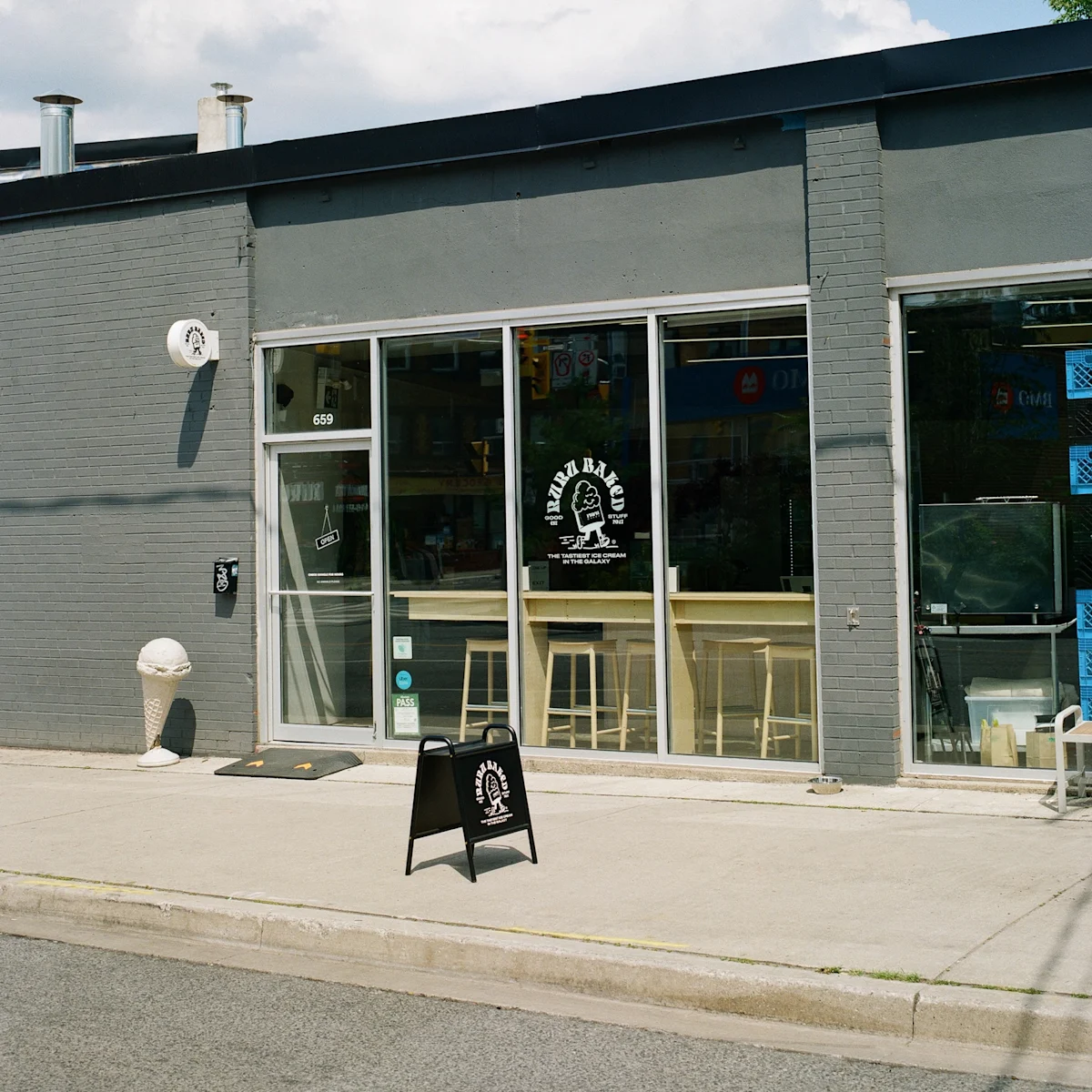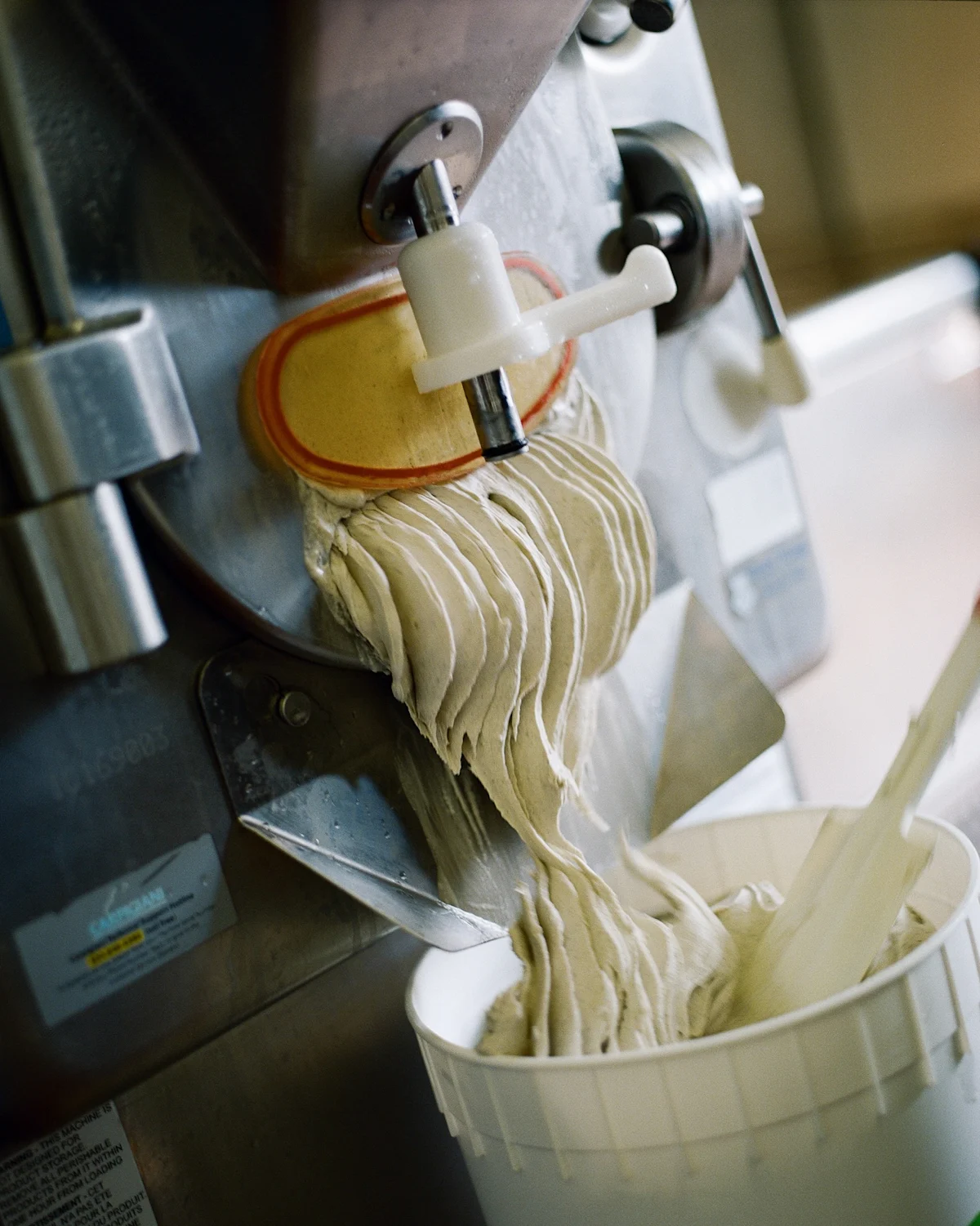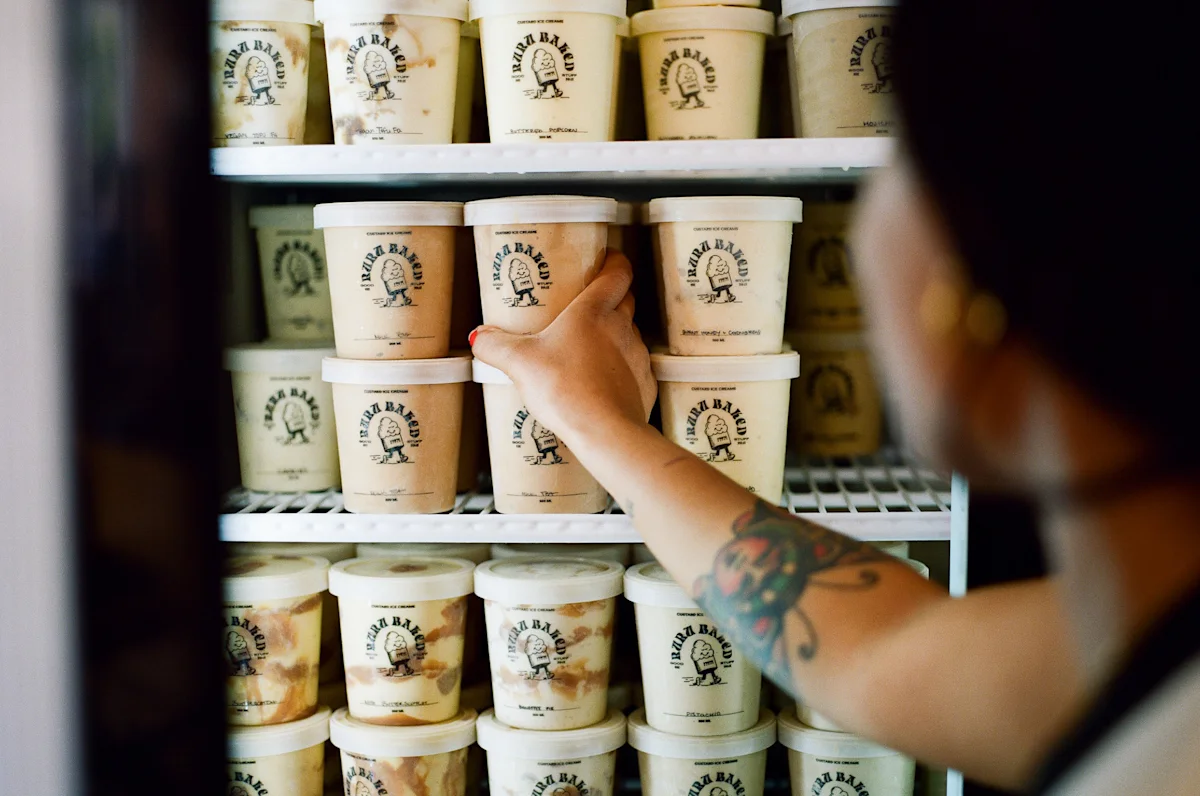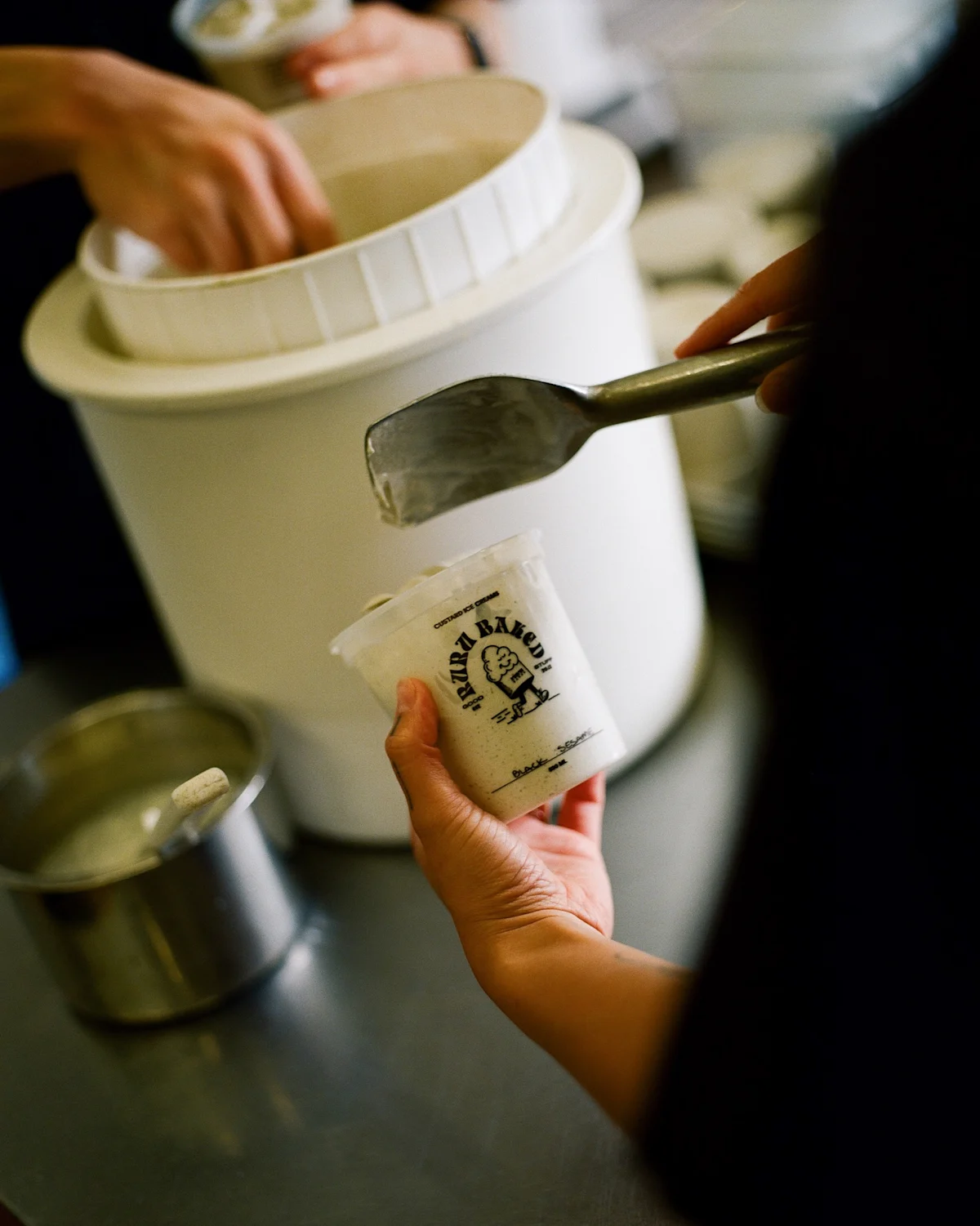Every five minutes, passersby would knock on the door of Ruru Baked hoping the worst wasn’t true. Each time owner Luanne Ronquillo would apologetically gesture to the 'CLOSED' sign and their faces would crumple into expressions of actual anguish: they needed their fix. They needed the euphoric effects of Honeycomb Cereal Milk or Banoffee Pie, ice-cream so decadent and silky it developed addicts. Count myself among them. This sensational shop began modestly in 2017 as a semi-serious creative outlet while Luanne worked a day job selling trips to luxury villas, but once the COVID-19 pandemic forced everyone indoors, Luanne was met with an opportunity to turn her side hustle into a real business. With early batches selling out faster than melting ice-cream, it was clear Toronto was ready for more. In January of 2021, Ruru took over the west end space of The Lansdowne Cone, refurbished it with her husband and handy friends, and has since expanded to a second location in Pacific Mall. Ruru heads, you’ve been warned: Both shops are closed on Mondays.
You’re a pastry chef by trade, right?
⎯⎯⎯ Yeah, I don't have my journeyman’s or anything like that. But I went to school for baking and pastry arts in 2008, and 2009. I did it for, I would say, three to five years, and then didn't love it and started doing other things.
What turned you off?
⎯⎯⎯ The environment of the kitchen. So, multiple things: If I wanted to be a baker, then that meant really early mornings. Sometimes you do night shifts because you're getting the bread ready for like 7 a.m. So I didn't love that lifestyle and, you know, being awake all night and sleeping during the day. So I decided that I was going to do restaurant stuff. I went into fine dining. And that was really stressful. Still really early mornings, which I like now but, as a young adult, I didn't love it because I wanted to party and stuff. But yeah, the environment wasn't great. People are getting yelled at all the time. You're making no money, you get no benefits—at the time, you were getting no benefits. And you just, like, work your ass off and get very little reward other than a creative outlet. So I just decided that I was gonna do corporate stuff and do the baking on the side as a fun thing.
And this was in Toronto?
⎯⎯⎯ This was in Calgary.
Are you from Calgary?
⎯⎯⎯ I grew up in Pickering, and then my family moved to Calgary when I was 10. Then me and my husband moved back when we were 27.

Tell me the story behind Ruru. When and why?
⎯⎯⎯ Oh, man, ‘why’ is a great question. So when: in 2017ish. I was working at the luxury villa company, and I loved that job at first because I love to travel. When we were in Calgary, before we moved to Toronto, I was working as an office manager in an accounting firm—not the job that I wanted to be doing. I will say I learned so much about finances and accounting, which helped with the business, and with my personal stuff as well, but I would never do that as a career. So when we moved to Toronto, I was like, ‘You know what? I'm going to work, I’m going to do travel.’
My mom's a travel agent, she has been forever. And I ended up working at this luxury villa place. It was great. They sent me to a bunch of places. I stayed in all these nice villas, but I was on call all the time because we had clients overseas, so you just had to be available at all times. I also realized that, with sales, I'm not a super money-driven person, I care about finances, but I'm not like I need to make a certain amount of money, and so sales just wasn't really right for me. It felt like a lot of pressure. So then I needed a creative outlet and I started doing the ice cream and baked goods just for fun. I was going to do an ice cream and pie subscription service, and then I realized that's probably not a great idea, because who's going to eat ice cream and pie every month? Lo and behold, people do that. So it just started out as a creative outlet for me. Then I kind of started taking it more seriously. I invested like $500 into the business to buy equipment. One of my friends, who is a creator, had an apartment here that she was never in.
Where was that?
⎯⎯⎯ It was over by the old Haven store on the east end. So she's like, ‘Just use my apartment. We're gonna be in the apartment once a quarter, so you can just use it.’ I would work nine to six at the villa place, and then I would go to her apartment and make ice cream and baked goods. I would take orders during the week, make the ice creams and pastries, and then deliver them on weekends. So that's how it all started.
I started in 2017. I bought a bigger machine for, like, $9,000 in 2018. Started doing a lot more collabs with Colour Cannabis and Hoegaarden. Then I joined my best friend’s marketing agency, became a partner there, really didn't take Ruru Baked seriously—was doing pop-ups here and there—and then the pandemic hit in 2020. Before the pandemic, I'd, you know, upped my scale of it. I got a little small commercial kitchen space. I would say it was like 100 square feet in the back of Empire Espresso on College—which is now Coco's—and did all my production out of there. When the pandemic hit, I was like, ‘Oh, I have nothing. I have to do this, I have to do Ruru Baked full-time.
People needed their Ruru fix. I can relate. The first time I had your Honeycomb Cereal Milk it I texted 30 people about it. How did you develop the amazing texture? Did you enjoy that experimentation?
⎯⎯⎯ For sure. So we only did ice cream for one day at pastry school out of the two years. I got a very introductory lesson. Then when I worked at the fine dining restaurant after school, we did a lot of ice cream there. I could not for the life of me remember that recipe, but I just took a recipe I found online, and then read up about ice cream science and ingredient function, and I was like, ‘Okay, you need more fat, more sugar if you want it to be like this, you need to churn it like this if you want to have a denser texture.’ So I just played around with all of the ratios until I finally got something I liked. Which shouldn't take too long. I started there. As I scaled and grew—because of the different machines—I had to keep adjusting my formulas. It's sort of evolved since the first recipe I ever created, and it continues to evolve depending on what ingredients, or what flavour it is.
That's cool. It's kind of bespoke. What was the first recipe flavour?
⎯⎯⎯ It was pandan with candied walnuts. I was watching a lot of Chef's Table back then, so I was like ‘Oh, I want to do something fun and unique.’
I remember when Ruru was really taking off. Do you remember your first sale or the moment you knew this could really work?
⎯⎯⎯ No, I don't remember my first sale. I remember the moment I thought ‘Okay, this actually might be a thing.’ I think I was doing curbside delivery. So I'd make ice cream all week and then on Saturdays and Sundays, people could come pick it up. Sara at Empire said that was fine, and that I could use her shop to do that out of. They let me do that, which was great. And so I was sitting on my couch on my phone, and I was like, ‘Okay, if I sell 300 pints at $9 each, I'll make under $3,000, and I will be able to pay off my ingredients, which is around 20-30% of the cost.’
Then I was like, ‘Okay, so I'll spend like two weeks, I'll make 300 pints—it was the most ice cream I've ever made—and I'll try to sell that all within one month.’ I had been making ice cream for two weeks straight. I just worked for like 12 hours, then I sat down—it's 10 o'clock at night, I’m eating a bowl of instant noodles because that's my first meal of the day—and I checked the website on Cargo Collective and everything sold out 45 minutes after I had posted. I was like, ‘Oh my God.’ I started crying, and I was like, ‘Okay, fuck, I have to do it again. I have to make all that ice cream again,’ which took me two weeks to make. I had to try and make it again for next week. That became the business model.

I'm also fascinated by the accounting background. Did you always want to start your own business?
⎯⎯⎯ Yes, I did always want to start my own business. One of my main core values is freedom. I am a great worker when I work for other people, but I don't love listening to other people and their decisions and how they want to do things. So I'll always do it, but I would have a max of like three years, and then I'd be like, ‘I'm not gonna do this anymore.’ I'd get bored really fast. So I always knew I wanted to start something for myself. And, you know, I’d done an e-commerce business with my best friend, the same best friend that I did the marketing agency Hook with.
I was gonna say, didn’t you have a clothing line at one point?
⎯⎯⎯ Yes, so we did a clothing line, then we stopped doing the clothing line; we did housewares online, and little gifts and stuff like that. And then I did the agency with her as well. I did love that—I never thought it would be a bakery because I was like, the hours are just gonna kill me.
I do get to take time off, the team really helps me do that. I get to build my own team, which is really nice. And I also get to make all the decisions within the business, which is really empowering.
How is it being a boss?
⎯⎯⎯ It has its pros and cons. Again, I love making the decisions. I also suck at making decisions, so I lean on the team a lot for that. Managing people is difficult. And we're really close here. I wouldn't say we're like a family, we're more like a sports team, but you not only have to think about how they're growing or how they're feeling professionally but also how their personal lives play into it. Especially when everyone's friends. And then I am a control freak. So I look over all aspects of the business, like the finances, [Luanne points to a hanging wire from the ceiling] the electrical, you know, literally everything.
This is anecdotal, but I find that a lot of creative entrepreneurs like you seem to value freedom over money, at least to an extent. Obviously, you need money to live, and want to make money. But what else really motivates you?
⎯⎯⎯ I still don't know, sometimes. Obviously, money is a motivator. I want to live comfortably. I don't want to struggle. But I think just not hating my life is a motivator. You know, I didn't want to feel like I was going to a job and wasting my time and wasting my life away. This doesn't feel like that at all. I tell everyone who works here ‘I don't want it to feel like that for you either. I want to feel like you're contributing, and that you feel like you're doing something here. If at any time you don't feel like that, I am more than okay if you leave. You have that choice.’
I also think about, like, what would I do if I didn't have this? And I have no idea. I don't know what I'd do. I’d be a writer. I just have to learn how to write. But I am risk averse; everything's calculated. I typically don't do things unless I know it’s gonna work.
And how do you know it’s gonna work?
⎯⎯⎯ Super educated guesses. Like, I'm pretty sure if we did the worst we could possibly do and it was still successful, then I'd just go with that.

I’m thinking of that Emily Weiss quote. She said her goal with Glossier was to create a beauty brand that people wanted to wear the sweatshirt of, like merch. I feel like you’ve done that with Ruru. People show their allegiance to this brand. How have you found that growth?
⎯⎯⎯ The word community gets thrown everywhere these days, and I don't know if people fully understand what it means or if they really appreciate what it means. It's just such a buzzword. And collab—everything's a collab.
Everything is everything. Words are meaningless now. But you actually have a community.
⎯⎯⎯ Yeah, I think what did it for us was just us being authentic to ourselves—another word that gets thrown around a lot. But when I started Ruru Baked, and when it was hot during the pandemic, I think people, for the most part, just knew it was me – sometimes it was my husband Sandro [who founded SSSOAPS, which Luanne carries in her shop.] It was a mom-and-pop sort of situation. Then we made a lot of friends through it, and then they became our community. Then they would bring their friends, and then they would join the community. We're not a huge business, although I'd love to be one day, maybe. But it becomes not yours anymore. Like, it’s name: my nickname is Ruru, and it’s my shop, but it's not really about me anymore. So, staying true to ourselves, and being transparent about who we are.
And who are you?
⎯⎯⎯ We're just a bunch of nerds.
How big is the team?
⎯⎯⎯ Right now we have 16. And then I just hired someone today for Pacific Mall, so it’ll be 17.
What’s the best-selling flavour?
⎯⎯⎯ Banoffee Pie. Actually, Super Baked. It only comes out once a year, but that is our best-selling flavour. People fiend for Super Baked all year long.
The mythical Super Baked.
⎯⎯⎯ That one was a collab with Superette, and they came up with the name Super Baked, which was really clever. We came out with it for 4/20. It, coincidentally, looked like a nug of weed. But everyone asks about it all the time.

What’s in it?
⎯⎯⎯ It’s pandan ice cream with Oreo crumbs and then there’s a sea salt score cookie, brownie chunks and a coconut caramel. It’s what you want to eat when you’re high.
Going back a bit, your mom is a travel agent? Was your family like ‘Do your thing!’?
⎯⎯⎯ Yeah, we’re an immigrant family, we emigrated from Singapore. Asian parents always want you to be, like, a doctor, a lawyer, something that makes a lot of money. My dad’s a mechanic, my mom’s a travel agent, and they wanted me to go into hotel and restaurant management. The only reason I went into baking school is because it required the least amount of prerequisites and was the shortest amount of time. So I was like ‘You want me to go to school right away? I’m just going to do the easiest thing possible’ and then it ended up working out in my favour. They both just want me to be happy at the end of the day. So whatever I do, as long as I’m happy about it, they’re happy about it.
And what’s next?
⎯⎯⎯ What is next? I have no idea.
– East Room is a shared workspace company providing design-forward office solutions, authentic programming and a diverse community to established companies and enterprising freelancers. We explore art, design, music, and entrepreneurship. Visit our News & Stories page to read more.